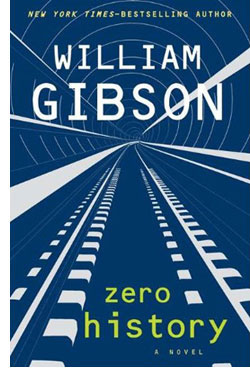 |
 |
 William Gibson
William Gibson
Zero History
Reviewed by: Rick Kleffel © 2010
Putnam
USA Trade Hardcover, First Edition
ISBN 978-0-399-15682-3
Publication Date: 05-01-2010
406 pages, $ 26.95
Date Reviewed: 09-11-2010
Index:
Science Fiction
General Fiction
Mystery
Poetry is matter of perspective, a slant, a version of vision in which words provide a light that cannot be found in the natural world. And not surprisingly, poetry cannot be contained or pigeonholed as easily as bookstores might prefer it to be. It's so much easier for shoppers to see the broken lines, the Robert Frost volumes, and know: "This is poetry."
But science fiction comes with many of the same provisos. It too is a perspective, a form of writing that offers us an unnatural vision of the natural world. Yes, you can craft science fiction out of prose, or alternately, write poetry with science fictional subjects. But the matter, the atoms of science fiction can also be arranged to look like prose, and appear to cast a natural light on the natural world. Nonetheless, they are still radioactive. You look at this William Gibson novel, 'Zero History,' and it looks like a regular novel about the regular world.
It's not. It is, at an atomic level, science fiction. And that prose is, at an atomic level, not what it appears to be on the page. It glows. It is dangerous and unstable, and liable to undo your tidy vision of the world around you.
From the outside, 'Zero History' is the third in a loose series of novels coalescing around Hubertus Bigend, who first made an appearance in 'Pattern Recognition.' It takes up shortly after 'Spook Country,' when we once again meet Hollis Henry and Milgrim who reluctantly accept employment, such as it is, by Bigend.
In the post-'Spook Country' world, everyone's net worth has been at least effectively halved if not erased. The locative art world has been run over by iPhone augmented reality apps, but no matter how much technology you throw at the world, you still need humans to catch as well as pitch it. Bigend, an art historian in the sense that he wants to turn his personal history and that of the world around him into his own work of art, is ever alert to those on the same plane as he is. He turns his focus to a particular subset of fashion, itself of course an expression of change, a wavefront to be shaped for Bigend's profit and amusement. For Bigend, the latter tends to lead to the former, or so he asserts.
From the first immersive sentence in this novel to the final swan song, Gibson uses his version of the English language to envelop the reader in a surreal haze of tomorrow's yesterday. This is the present as remembered by the future, the present as seen from the perspective of the past in an imperfect prediction. Language can never capture quotidian reality, and Gibson has no interest in doing so. He exploits the spaces between the words to craft a vision of life between moments of ever-quickening change. In the seemingly-still moments when a man and a woman converse in a café, reality shifts.
All this surreal subtlety is quite fine by itself, but Gibson is canny enough to arguably and utterly re-invent the spy thriller in a post-Cold War era. The conflicts that matter, the wars that decimate out world are not so much between countries as between companies. The players are not spy chiefs, secret police and ambassadors, but executives, industrial spies and visionary buyers. In this primarily economic battlefield, Hollis, Milgram and Bigend find themselves pursuing an enemy whose best defense, like Satan, is the fact that nobody is sure he (or she) exists. And even if you take that leap of faith, you must soar over the abyss and try not to stare too long. Internalizing eternity can have negative consequences on the open market.
Gibson's vision of the now as a surreal collage of the past and the future is as furiously paced as a battle between competing computer companies. Hollis, Milgrim, and an assortment of wonderfully-wrought characters are compellingly fun to follow in Gibson's personalized version of the English language. As a reading experience, there's a hallucinogenic feel to what is happening, so that danger and beauty become indistinguishable from one another. Does the distinction even matter? So long as you're in Gibson's intense spy narrative, probably not.
What Gibson is doing with his latest novel is not so different from what he has always done. He grabs language with the verve of a painter at his easel, writing science fiction at the prose level. The story happens, after all, not in the words themselves so much as the spaces between them. He uses science fiction prose to accomplish the aims of poetry. 'Zero History' is no accidental title. This is a novel that seeks to erase the world around us, and replace it with Gibson's informative linguistic simulacrum. This is a novel that does what the best novels do, and have done since words first found this form. Gibson re-writes this moment. We can open our eyes now.
|
 |
|
|
 |
| |
Review Archive
All Reviews alphabetized by author.
General Fiction
Non-Genre, general fiction and literature.
Horror
Supernatural fiction, supernatural horror and non-supernatural horror.
Science Fiction
Science fiction, science fantasy, speculative fiction, alternate history.
Fantasy
Fantasy, surrealism and magic realism.
Mystery
Crime, thrillers, mystery, suspense.
Non-Fiction
Non-Fiction, True Crime, Forteana, Reference.
Poetry
|
|
 |
|




